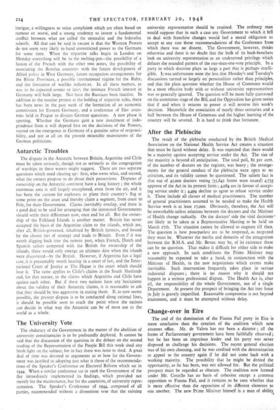Antarctic Troubles
The dispute in the Antarctic between Britain, Argentina and Chile must be taken seriously, though not as seriously as the congregation of warships in these waters might suggest. There are two separate questions which need clearing up : first, who owns what, and second, what the owners propose to do about theft' possessions. Disputes of ownership on the Antarctic continent have a long history ; the whole enormous area is still largely unexplored, even from the air, and it has been the custom for explorers to plant their country's flag at some point on the coast and thereby claim a segment, from coast to Pole, for their Government. Claims inevitably overlap, and there is a good deal to be said for arranging that the interested Governments should settle their differences now, once and for all. But the owner- ship of the Falkland Islands is another matter. Britain has never accepted the basis of the Argentine claim to the islands, which are, after all, British-governed, inhabited by British farmers, and bound by the closest ties of strategy and trade to Britain. Even if it was worth digging back into the remote past, when French, Dutch and Spanish sailors competed with the British for ownership of the islands, there would only emerge an ultimate date when the islands were discovered—by the British. However, if Argentina has a legal case, it is presumably worth hearing in a court of law, and the Inter- national Court of Justice at The Hague is the court which should hear it. The same applies to Chile's claims in the South Shetlands and, for that matter, to the claims which Argentina and Chile have against each other. But if these two nations have any hesitations about the validity of their Antarctic claims, it is reasonable to ask that they should be less aggressive in stating them. If, as now seems possible, the present dispute is to be conducted along rational lines, it should be possible soon to reach the point where the nations can decide in what way the Antarctic can be of most use to the world as a whole.






























 Previous page
Previous page